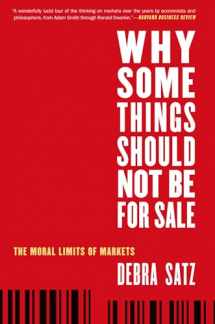
Why Some Things Should Not Be for Sale: The Moral Limits of Markets (Oxford Political Philosophy)
Book details
Summary
Description
For many, markets are the most efficient way in general to organize production and distribution in a complex economy. But what about those markets we might label noxious--markets in addictive drugs, say, or in sex? In Why Some Things Should Not Be for Sale, philosopher Debra Satz takes a penetrating look at those commodity exchanges that strike most of us as problematic. What considerations, she asks, ought to guide the debates about such markets? Satz contends that categories previously used by philosophers and economists are of limited use in addressing such markets because they are assumed to be homogenous. Accordingly, she offers a broader and more nuanced view of markets--one that goes beyond the usual discussions of efficiency and distributional equality--to show how markets shape our culture, foster or thwart human development, and create and support structures of power. Nobel Laureate Kenneth J. Arrow calls this book "a work that will have to be studied and taken account of by all those concerned by the role of the market as compared with other social mechanisms."


We would LOVE it if you could help us and other readers by reviewing the book
Book review





